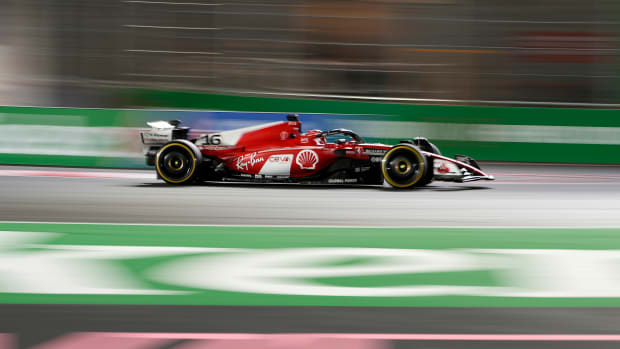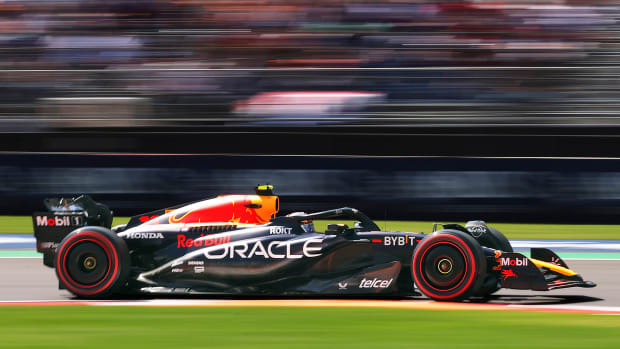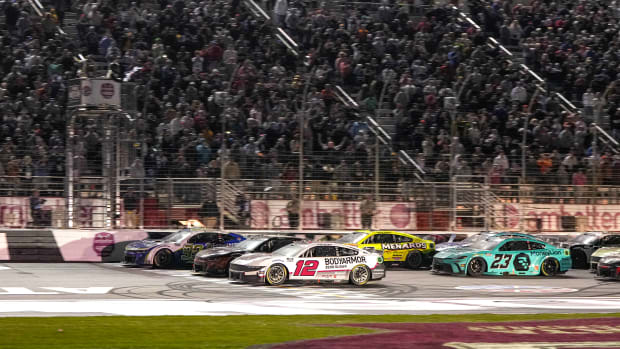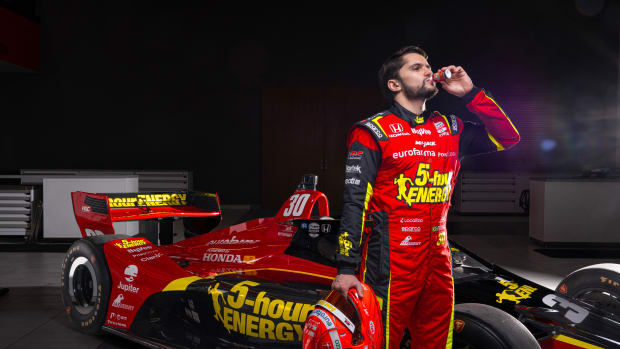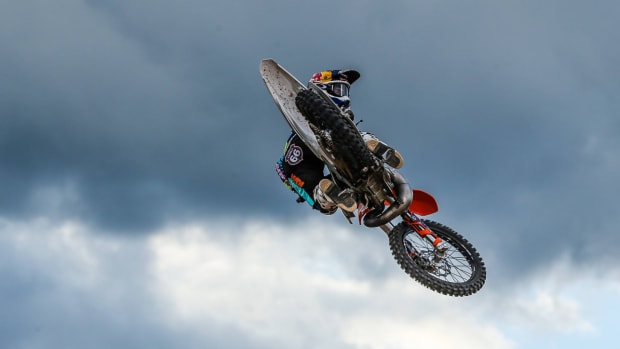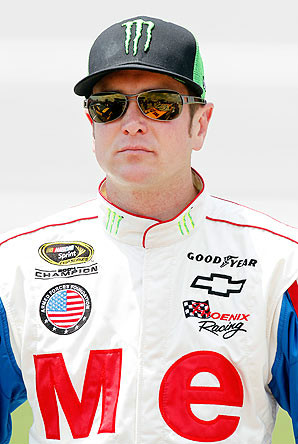
Kurt Busch, under-funded Phoenix Racing lament missed opportunity
Suddenly Busch pulled up in the No. 51 car. The car that did not have a sponsor. The one that, instead, was painted with references to the car driven by the Ricky Bobby character in the movie Talladega Nights, complete with a picture of a cougar on the hood and the quote "I wanna go fast" plastered on the back. It was an attempt by Busch and the bare-budget Phoenix Racing team to have some fun with the face that the team had no sponsor for one of the more expensive races of the year.
At this moment, the fun was definitely over. Busch removed his helmet -- hair bathed in sweat -- leaned his head back and let out a heavy sigh. Then he crawled from the car, received a few pats on the back from members of his crew, tightened his lips and shook his head, then strode quickly to his hauler. It's all fun and games until somebody gets hurt. And emotionally, Busch and his team were absolutely aching.
That's because with seven laps to go, Busch was running in the top five and had a legitimate shot at pulling off the victory. This would have been a major, major deal for Phoenix Racing, which has managed only one Cup Series victory (a win that just happened to have occurred at Talladega) in more than 20 years of sporadic efforts. Even a top-five finish would have been cause for celebration for a team that had managed only one top-10 run all season.
Then came a tap, and a spin, and Busch was desperately trying to avoid contact with the wall. He almost made it, but not quite. Enough damage was incurred that Busch had to head to the pits, a trip he made -- in the spirit of Ricky Bobby -- by going in the wrong direction down pit road. By the time the race ended a few minutes later, Busch's dream day had dissolved into a 20th-place finish. Making matters worse, the driver who gave Busch that inadvertent tap, Brad Keselowski, was heading to Victory Lane to celebrate.
"It's pretty disappointing to come to one of the places we have circled on the schedule, run well all day and have it end like this," Busch said in one of his few post-race comments.
In Keselowski's defense, the bump he put on Busch's car was far from malicious. It certainly wasn't like the smack Danica Patrick delivered to Sam Hornish Jr. shortly after they crossed the finish line in Saturday's Nationwide race. This simply was one of those racin' deals, the type that happens all too often in the tight packs created by restrictor plates.
To his credit, Keselowski was contrite afterward, saying, "I want to apologize for that. He [Busch] ran a great race. He's been a great friend of mine over the last few years [they were teammates at Penske Racing]. He really helped me get to where I am today. The last thing I want to do is [affect] a situation where he had a shot at winning."
That might be true, but it still is little comfort to Busch and Phoenix Racing. When Jimmie Johnson goes out early and finishes 35th, as he did Sunday, he can look at the cameras, lament about it being a tough day, and then say, "We'll just try to get them next week at Darlington." Busch can't be so cavalier about bad days. Phoenix Racing has never completed an entire Cup season, and in the fickle world of NASCAR financing, there is no guarantee it can make it to the end of this season. The team needs positive results in order to ensure there will be a next week.
Phoenix Racing is owned by James Finch, a former dirt-track and motorcycle racer who has run a successful construction company out of Panama City, Fla., for the past 30 years. Finch began operating a race team on the side in the mid-1980s with Jeff Purvis as the driver. The team won three dirt-track titles, and Finch estimates they racked up more than 300 race victories.
So beginning in 1990 Finch decided to take a shot at NASCAR, opening up a shop in Spartanburg, S.C. But he was never truly all in. Instead, Finch would build up funds each year and then race until the money ran out. And in the early days, that didn't take long. Phoenix Racing made a total of 31 Cup Series starts over seven seasons (from 1990 through 1996), and then left Cup racing entirely until 2001.
"I told myself that I wasn't going to go broke in this sport," explained Finch, who has been to Victory Lane on occasion in the Nationwide and ARCA series. "So we'd do what we could with what we had. We'd race as many times as we could, then cut back so we could try it again the next year."
Since he could never commit to a full season, Finch had no shot at luring any of the top drivers to his team. In fact, it was difficult for him to get anybody behind the wheel of his cars for more than a handful of races. In 2004, for example, Phoenix Racing had a total of seven different drivers compete in 26 events.
The team did pick up that surprise victory from a then-unknown Keselowski at Talladega in 2009. But that was one of only five races Keselowski ran for Finch, and by the end of the season the rising young star had been scooped up by Penske Racing. After that Finch returned to using a mix of has-beens (Bobby Labonte, Sterling Marlin) and never-weres (Mike Bliss, Jan Magnussen).
Then came the opportunity to join forces with a former Cup champion. Busch, who won the Sprint Cup title in 2004, parted ways with Penske Racing in the offseason after a highly publicized outburst at last year's season finale. He needed a place to heal his reputation, and Finch needed an upper-tier driver still in his racing prime. So for the first time, Finch decided to run an entire Sprint Cup season.
"On an under-funded team, I always had the real young drivers or the ones who got too old," Finch said. "So when the deal came up with Kurt, I had to try it. We have a hard-working group of guys who want that trophy at the end of every race. Kurt is the guy who can deliver it to them.
"This team deserves that. They're willing to work their way through any [disadvantages] we might have. We're doing it pretty much with hard work and heart."
Sunday afternoon at Talladega Superspeedway, that heart was broken.
